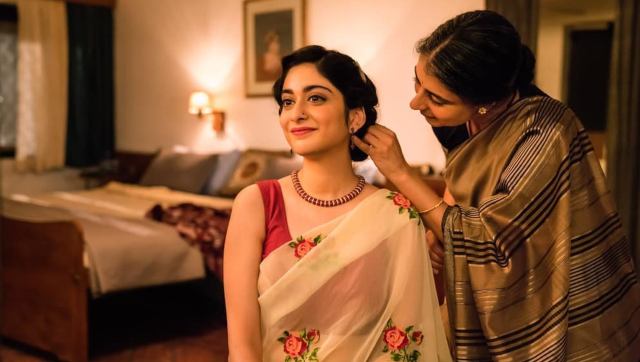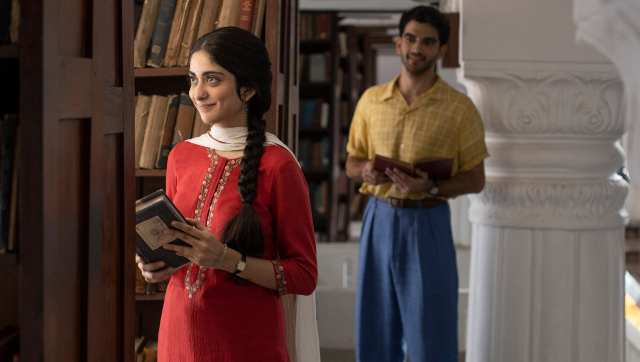The first episode of A Suitable Boy, an adaptation of Vikram Seth’s novel of the same name, released on UK network BBC One on Sunday. The six-part series, set in post-Independence India, marks filmmaker
Mira Nair’s
television debut. It will soon release in India and worldwide on Netflix. The story centres around a 19-year-old university student Lata, portrayed by newcomer Tanya Maniktala, who struggles with her life being mapped out thanks to old traditions and an overbearing mother who wants to find her a suitable husband. “A Suitable Boy is a modern classic about a time when a country is finding its feet after Independence. It is a massive yet intimate saga; an extraordinary tale of love and friendship across class and certainly across religion,” Nair had recently said about the show. [caption id=“attachment_8587881” align=“alignnone” width=“640”] Tanya Maniktala and Mahira Kakkar in a still from A Suitable Boy[/caption] Ishaan Khatter, Tabu, Rasika Dugal, Shahana Goswami, Ram Kapoor, Vijay Varma, Mahira Kakkar, Mikhail Sen, Danesh Razvi, Vijay Varma, Ranvir Shorey, Vinay Pathak, Randeep Hooda and Namit Das make up the rest of the show’s cast. The hefty novel has been adapted for screen by Andrew Davies, who has previously written the screenplays for BBC’s Pride and Prejudice and War and Peace. A Suitable Boy premiered to mixed reviews from critics, who lauded the show for its massive Indian cast and crew, but did point out its stereotypical portrayal of India. Here is a compilation of the reviews so far “For all its good intentions, this is still an orange-filtered fantasy version of India, where the characters speak English with the same mannered Indian accents and nobody can do anything without a sitar twanging,” notes The Independent’s
Ed Cumming. Livemint’s
Raja Sen makes a similar observation : “The show feels like an amateurish stage play, a high school-quality musical minus the music. This is partly because of the expository and entirely functional nature of the dialogues—“You are the Revenue Minister, I am the Home Minister,” informs a man, as if politicians were gnats—but more so because of cardboard accents. Not far removed from Apu of The Simpsons, here we have a cast of mostly talented Indian actors trying, bafflingly, to sound browner. The cadences are unforgivable as characters try to add weird Hindi-esque lilts to English sentences. Chitra Ramaswamy of The Guardian
writes that while the show is “beautiful, expensive and groundbreaking in its casting” it does feel “uncomfortably old school.” “This may be the first Indian period drama of its kind in British TV history, but it remains an India that a British audience is used to seeing. The cast mostly speaks English, with a smattering of Urdu and Hindi, and in India there has been some scoffing at the accents. These are the oddities of the genre: no one spoke Russian in Davies’s W_ar and Peace_, either. It is just that in the midst of our cultural reckoning, the old ways are starting to look downright weird,” she says. Susannah Butler feels differently about the show, and writes for
Evening Standard
, “Nair has succeeded in creating a world with charm and drama. There are six episodes and I am looking forward to an Indian summer.”
Tanya Maniktala and Mahira Kakkar in a still from A Suitable Boy[/caption] Ishaan Khatter, Tabu, Rasika Dugal, Shahana Goswami, Ram Kapoor, Vijay Varma, Mahira Kakkar, Mikhail Sen, Danesh Razvi, Vijay Varma, Ranvir Shorey, Vinay Pathak, Randeep Hooda and Namit Das make up the rest of the show’s cast. The hefty novel has been adapted for screen by Andrew Davies, who has previously written the screenplays for BBC’s Pride and Prejudice and War and Peace. A Suitable Boy premiered to mixed reviews from critics, who lauded the show for its massive Indian cast and crew, but did point out its stereotypical portrayal of India. Here is a compilation of the reviews so far “For all its good intentions, this is still an orange-filtered fantasy version of India, where the characters speak English with the same mannered Indian accents and nobody can do anything without a sitar twanging,” notes The Independent’s
Ed Cumming. Livemint’s
Raja Sen makes a similar observation : “The show feels like an amateurish stage play, a high school-quality musical minus the music. This is partly because of the expository and entirely functional nature of the dialogues—“You are the Revenue Minister, I am the Home Minister,” informs a man, as if politicians were gnats—but more so because of cardboard accents. Not far removed from Apu of The Simpsons, here we have a cast of mostly talented Indian actors trying, bafflingly, to sound browner. The cadences are unforgivable as characters try to add weird Hindi-esque lilts to English sentences. Chitra Ramaswamy of The Guardian
writes that while the show is “beautiful, expensive and groundbreaking in its casting” it does feel “uncomfortably old school.” “This may be the first Indian period drama of its kind in British TV history, but it remains an India that a British audience is used to seeing. The cast mostly speaks English, with a smattering of Urdu and Hindi, and in India there has been some scoffing at the accents. These are the oddities of the genre: no one spoke Russian in Davies’s W_ar and Peace_, either. It is just that in the midst of our cultural reckoning, the old ways are starting to look downright weird,” she says. Susannah Butler feels differently about the show, and writes for
Evening Standard
, “Nair has succeeded in creating a world with charm and drama. There are six episodes and I am looking forward to an Indian summer.”
A Suitable Boy review round-up: Mira Nair's BBC drama series feels 'uncomfortably old school'
FP Staff
• July 27, 2020, 15:55:28 IST
A Suitable Boy, adapted for screen by Andrew Davies, will soon release in India on Netflix.
Advertisement
)
End of Article